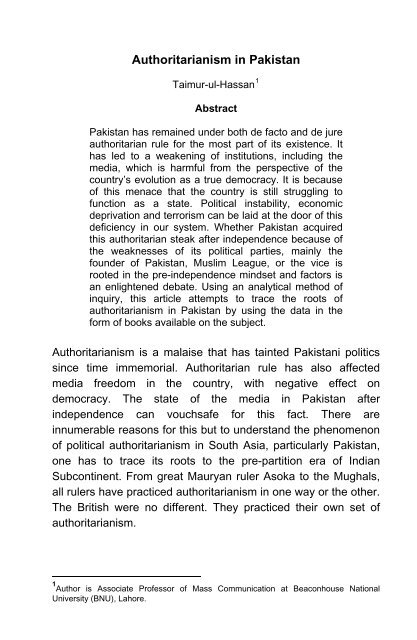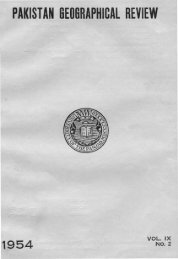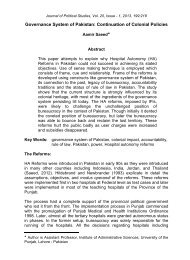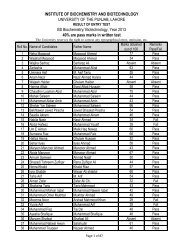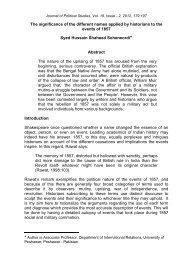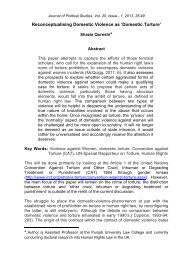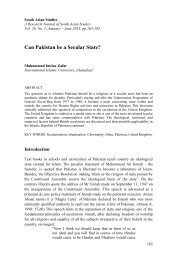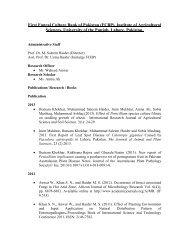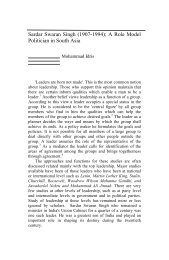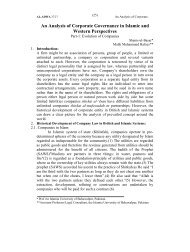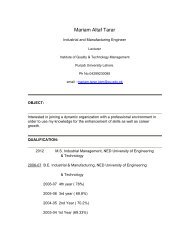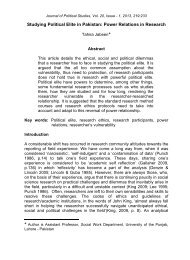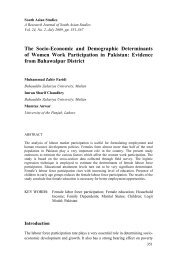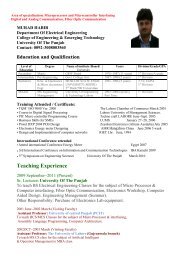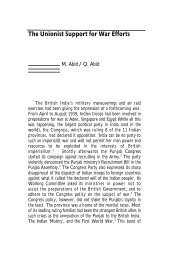Roots of authoritarianism in Pakistan-KU.pdf
Roots of authoritarianism in Pakistan-KU.pdf
Roots of authoritarianism in Pakistan-KU.pdf
You also want an ePaper? Increase the reach of your titles
YUMPU automatically turns print PDFs into web optimized ePapers that Google loves.
Authoritarianism <strong>in</strong> <strong>Pakistan</strong><br />
Taimur-ul-Hassan 1<br />
Abstract<br />
<strong>Pakistan</strong> has rema<strong>in</strong>ed under both de facto and de jure<br />
authoritarian rule for the most part <strong>of</strong> its existence. It<br />
has led to a weaken<strong>in</strong>g <strong>of</strong> <strong>in</strong>stitutions, <strong>in</strong>clud<strong>in</strong>g the<br />
media, which is harmful from the perspective <strong>of</strong> the<br />
country’s evolution as a true democracy. It is because<br />
<strong>of</strong> this menace that the country is still struggl<strong>in</strong>g to<br />
function as a state. Political <strong>in</strong>stability, economic<br />
deprivation and terrorism can be laid at the door <strong>of</strong> this<br />
deficiency <strong>in</strong> our system. Whether <strong>Pakistan</strong> acquired<br />
this authoritarian steak after <strong>in</strong>dependence because <strong>of</strong><br />
the weaknesses <strong>of</strong> its political parties, ma<strong>in</strong>ly the<br />
founder <strong>of</strong> <strong>Pakistan</strong>, Muslim League, or the vice is<br />
rooted <strong>in</strong> the pre-<strong>in</strong>dependence m<strong>in</strong>dset and factors is<br />
an enlightened debate. Us<strong>in</strong>g an analytical method <strong>of</strong><br />
<strong>in</strong>quiry, this article attempts to trace the roots <strong>of</strong><br />
<strong>authoritarianism</strong> <strong>in</strong> <strong>Pakistan</strong> by us<strong>in</strong>g the data <strong>in</strong> the<br />
form <strong>of</strong> books available on the subject.<br />
Authoritarianism is a malaise that has ta<strong>in</strong>ted <strong>Pakistan</strong>i politics<br />
s<strong>in</strong>ce time immemorial. Authoritarian rule has also affected<br />
media freedom <strong>in</strong> the country, with negative effect on<br />
democracy. The state <strong>of</strong> the media <strong>in</strong> <strong>Pakistan</strong> after<br />
<strong>in</strong>dependence can vouchsafe for this fact. There are<br />
<strong>in</strong>numerable reasons for this but to understand the phenomenon<br />
<strong>of</strong> political <strong>authoritarianism</strong> <strong>in</strong> South Asia, particularly <strong>Pakistan</strong>,<br />
one has to trace its roots to the pre-partition era <strong>of</strong> Indian<br />
Subcont<strong>in</strong>ent. From great Mauryan ruler Asoka to the Mughals,<br />
all rulers have practiced <strong>authoritarianism</strong> <strong>in</strong> one way or the other.<br />
The British were no different. They practiced their own set <strong>of</strong><br />
<strong>authoritarianism</strong>.<br />
1 Author is Associate Pr<strong>of</strong>essor <strong>of</strong> Mass Communication at Beaconhouse National<br />
University (BNU), Lahore.
Journal <strong>of</strong> Political Studies<br />
“In the Indian Subcont<strong>in</strong>ent, the whole concept <strong>of</strong> the power <strong>of</strong><br />
the monarch differed from that <strong>of</strong> European feudalism, <strong>in</strong> which<br />
the k<strong>in</strong>g had authority over all persons and th<strong>in</strong>gs <strong>in</strong> his doma<strong>in</strong>.<br />
This authority was delegated to the lords and the barons who<br />
vowed allegiance to him. Thus, the hierarchy <strong>of</strong> authority was<br />
built up. Both the lands and the people connected with it<br />
belonged to the feudal lord and through him to the k<strong>in</strong>g. This was<br />
a development <strong>of</strong> the Roman concept <strong>of</strong> the dom<strong>in</strong>ion. In India,<br />
the k<strong>in</strong>g had the right to collect certa<strong>in</strong> taxes from the land, and<br />
this revenue collect<strong>in</strong>g power was delegated to others. With<br />
disastrous results, the British broke up the traditional village<br />
communes known as Panchayats and <strong>in</strong>troduced oppressive<br />
feudalism.” 2 Feudalism <strong>in</strong> itself is a form <strong>of</strong> <strong>authoritarianism</strong>. “In<br />
delimit<strong>in</strong>g a formal sphere <strong>of</strong> politics, the British colonial system<br />
aimed at reconsolidat<strong>in</strong>g its authority and plac<strong>in</strong>g the networks <strong>of</strong><br />
social collaboration and control on a firmer foot<strong>in</strong>g.” 3<br />
Both <strong>Pakistan</strong> and India <strong>in</strong>herited the colonial legacy <strong>of</strong><br />
<strong>authoritarianism</strong>. It was quite evident <strong>in</strong> the political system <strong>of</strong><br />
both newborn countries. Immediately after <strong>in</strong>dependence <strong>in</strong><br />
India, “the rule <strong>of</strong> law was ever bent to subserve either executive<br />
action <strong>in</strong> the adm<strong>in</strong>istration or the will <strong>of</strong> dom<strong>in</strong>ant elements <strong>of</strong><br />
society.” 4 Whereas India made an effort to democratise itself –<br />
and has been quite successful – <strong>Pakistan</strong> failed to make a viable<br />
transition to democratic rule after emerg<strong>in</strong>g from the debris <strong>of</strong><br />
British colonialism. The colonial state was quickly replaced by<br />
authoritarian rulers, whether civilian or military. This was<br />
2 Khan, Lal, Crisis <strong>in</strong> the Indian Subcont<strong>in</strong>ent: Partition – Can it be<br />
undone?, (Wellred Publications), p. 18.<br />
3 Jalal, Ayesha, Self and Sovereignty: Individual and Community <strong>in</strong><br />
South Asian Islam s<strong>in</strong>ce 1850, (Lahore: Sang-e-Meel Publication), p.<br />
37.<br />
4 Misra, B.B, Government and Bureaucracy <strong>in</strong> India, 1947-1976, (New<br />
Delhi: Oxford University Press), p. 90.<br />
2
Authoritarianism <strong>in</strong> <strong>Pakistan</strong><br />
because the Muslim elite <strong>of</strong> <strong>Pakistan</strong> comprised <strong>of</strong> opportunists<br />
who only jo<strong>in</strong>ed the <strong>Pakistan</strong> Movement after it was apparent<br />
that a new Muslim state was go<strong>in</strong>g to emerge soon.<br />
The founder <strong>of</strong> <strong>Pakistan</strong>, J<strong>in</strong>nah himself has been accused <strong>of</strong><br />
be<strong>in</strong>g authoritarian. “Notwithstand<strong>in</strong>g the differential<br />
adm<strong>in</strong>istrative legacies, both India and <strong>Pakistan</strong> drew heavily on<br />
the colonial state’s methods <strong>of</strong> bureaucratic control and<br />
centralisation [after partition]. The government <strong>of</strong> India act <strong>of</strong><br />
1935, strengthen<strong>in</strong>g the very bureaucratic ‘steel frame’ <strong>of</strong> the<br />
British raj that had been the bête noire <strong>of</strong> Indian nationalists, was<br />
adapted to serve as the constitutional framework <strong>in</strong> both<br />
countries. In pr<strong>in</strong>ciple, the ideal <strong>of</strong> democracy based on the<br />
Westm<strong>in</strong>ster model <strong>of</strong> parliamentary government ensured a<br />
formal separation between the bureaucracy and a representative<br />
political executive. But <strong>in</strong> actual practice the bureaucratic<br />
<strong>authoritarianism</strong> <strong>in</strong>herent <strong>in</strong> the colonial state structure rema<strong>in</strong>ed<br />
largely <strong>in</strong>tact.” 5<br />
Like <strong>in</strong> India, Lord Mountbatten thought he would be asked to<br />
rema<strong>in</strong> the Governor-General <strong>of</strong> <strong>Pakistan</strong> too. But he was <strong>in</strong> for a<br />
surprise. “Mountbatten hoped and <strong>in</strong>deed expected to be asked<br />
to stay on as jo<strong>in</strong>t governor-general over both new dom<strong>in</strong>ions, at<br />
once symbolis<strong>in</strong>g their friendly and cont<strong>in</strong>ued cooperation while<br />
expedit<strong>in</strong>g the process <strong>of</strong> the f<strong>in</strong>al division <strong>of</strong> assets <strong>in</strong> an<br />
equitable manner. J<strong>in</strong>nah would hear noth<strong>in</strong>g <strong>of</strong> that, however,<br />
<strong>in</strong>sist<strong>in</strong>g he must become governor-general <strong>of</strong> <strong>Pakistan</strong><br />
himself…He was eager to enjoy at least a taste <strong>of</strong> power, to<br />
which he had given so much <strong>of</strong> his energy…Be<strong>in</strong>g governorgeneral<br />
would raise him eye-to-eye with Mountbatten, Attlee,<br />
5 Jalal, Ayesha, Democracy and Authoritarianism <strong>in</strong> South Asia: A<br />
Comparative and Historical Perspective, (Cambridge: Cambridge<br />
University Press), p. 18.<br />
3
Journal <strong>of</strong> Political Studies<br />
Smuts, and all the other heads <strong>of</strong> dom<strong>in</strong>ions <strong>of</strong> the<br />
Commonwealth the world over.” 6<br />
After putt<strong>in</strong>g his name forward as the Governor-General,<br />
J<strong>in</strong>nah’s first act “was to apply for powers under the 9th<br />
Schedule rather than Part II <strong>of</strong> the 1935 Act which gave him at<br />
once dictatorial powers unknown to any constitutional Governor-<br />
General represent<strong>in</strong>g the K<strong>in</strong>g.” 7 The powers <strong>of</strong> the N<strong>in</strong>th<br />
Schedule can be gauged from this: “The N<strong>in</strong>th Schedule gave<br />
even greater powers to the Governor-General than those<br />
available <strong>in</strong> Part II <strong>of</strong> the [1935] Act. For example, under Section<br />
67(b), if Legislature failed to pass a Bill <strong>in</strong> the form<br />
recommended by the Governor-General, the Governor-General<br />
might certify that the passage <strong>of</strong> a Bill was essential for the<br />
safety, tranquillity, or <strong>in</strong>terests <strong>of</strong> British India, or any part<br />
there<strong>of</strong>.” 8<br />
<strong>Pakistan</strong> was ‘J<strong>in</strong>nah’s <strong>Pakistan</strong>’ until he was alive. “As long as<br />
J<strong>in</strong>nah was alive (he died September, 1948), he was <strong>Pakistan</strong>.<br />
He held the position <strong>of</strong> Governor-General, but the powers and<br />
<strong>in</strong>fluence that he exercised were far beyond those normally<br />
associated with that <strong>of</strong>fice. The Cab<strong>in</strong>et rarely functioned without<br />
his directives. He was the supreme arbitrator between the Centre<br />
and the prov<strong>in</strong>ces.” 9 J<strong>in</strong>nah’s authoritarian legacy did not die<br />
with him. “The <strong>in</strong>ability <strong>of</strong> the Muslim League to transform itself<br />
from a movement to a vibrant, unified, and coherent political<br />
party, as well as J<strong>in</strong>nah’s death so early <strong>in</strong> the formation <strong>of</strong><br />
6 Wolpert, Stanley, J<strong>in</strong>nah <strong>of</strong> <strong>Pakistan</strong>, (New York: Oxford University<br />
Press), p. 333.<br />
7 Campbell-Johnson, Alan, Mission with Mountbatten, (London: Robert<br />
Hale), p. 156.<br />
8 B<strong>in</strong> Sayeed, Khalid, <strong>Pakistan</strong>: The Formative Phase: 1857-1948,<br />
(Karachi: Oxford University Press), p. 236.<br />
9 B<strong>in</strong> Sayeed, Khalid, The Political System <strong>of</strong> <strong>Pakistan</strong>, (Boston:<br />
Houghton Miffl<strong>in</strong> Company, 1967), p. 62.<br />
4
Authoritarianism <strong>in</strong> <strong>Pakistan</strong><br />
<strong>Pakistan</strong>, unleashed the divisive forces, that, more than India,<br />
threatened the survival <strong>of</strong> the young nation.” 10<br />
It is an undeniable fact <strong>of</strong> history that not more than 200 families<br />
have shared political power <strong>in</strong> <strong>Pakistan</strong> s<strong>in</strong>ce <strong>in</strong>dependence.<br />
These politicians have exploited the country <strong>in</strong> collaboration with<br />
the military. Lust for power has proved to be disastrous for<br />
<strong>Pakistan</strong>. “Masters <strong>of</strong> the new nation, the bureaucrats had little<br />
<strong>in</strong>terest <strong>in</strong> organis<strong>in</strong>g elections, and political developments<br />
follow<strong>in</strong>g J<strong>in</strong>nah’s death can only be described as chaotic. There<br />
were no fewer than seven prime m<strong>in</strong>isters <strong>in</strong> ten years. Liaquat<br />
Ali Khan (50 months <strong>in</strong> <strong>of</strong>fice) was assass<strong>in</strong>ated. His successors,<br />
Khwaja Nazimudd<strong>in</strong> (17 months); Mohammed Ali Bogra (29<br />
months); Chaudri Mohammed Ali (13 months); Shaheed<br />
Suhrwardy (13 months); I.I. Chundrigar (2 months); and Firoz<br />
Khan Noon (11 months), all became victims <strong>of</strong> palace<br />
<strong>in</strong>trigues…Throughout the 1950s two archetypal bureaucrats,<br />
Ghulam Mohammed and Iskander Mirza, brazenly abused their<br />
powers as head <strong>of</strong> state to make or break governments. In April<br />
1953, Ghulam Mohammed set an unfortunate precedent when,<br />
cit<strong>in</strong>g the government’s failure to resolve ‘the difficulties fac<strong>in</strong>g<br />
the country’, he dismissed Khwaja Nazimudd<strong>in</strong> and <strong>in</strong>stalled<br />
Bogra <strong>in</strong> his place. When Bogra responded by try<strong>in</strong>g to limit the<br />
governor general’s power, Ghulam Mohammed dismissed him<br />
too. And so it went on.” 11<br />
Power <strong>in</strong> <strong>Pakistan</strong> meant ‘no accountability’. It was a ticket to do<br />
as one pleased. Hence <strong>authoritarianism</strong> kept fester<strong>in</strong>g <strong>in</strong> the<br />
rul<strong>in</strong>g elite. “In contrast with the ‘Congress System’, the <strong>Pakistan</strong>i<br />
political process was chaotic immediately after <strong>in</strong>dependence,<br />
display<strong>in</strong>g a bewilder<strong>in</strong>g array <strong>of</strong> shift<strong>in</strong>g allegiances and<br />
10 Suleri, Z.A., <strong>Pakistan</strong>’s Lost Years (Lahore: Progressive Papers Ltd.)<br />
11 Jones, Owen Bennett, <strong>Pakistan</strong>: Eye <strong>of</strong> the Storm, (New Haven: Yale<br />
University Press), p. 230.<br />
5
Journal <strong>of</strong> Political Studies<br />
alliances. By 1954 the Muslim League which had founded the<br />
state was <strong>in</strong> term<strong>in</strong>al decl<strong>in</strong>e. Personalities counted rather than<br />
ideologies or party <strong>in</strong>stitutionalisation. The lack <strong>of</strong> expenditure on<br />
what would today be termed human development hampered the<br />
emergence <strong>of</strong> a civil society which might have questioned the<br />
grow<strong>in</strong>g <strong>in</strong>fluence <strong>of</strong> the army.” 12<br />
S<strong>in</strong>ce there was no one to question the whims <strong>of</strong> the army or the<br />
politicians, <strong>Pakistan</strong> kept fall<strong>in</strong>g deeper and deeper <strong>in</strong>to the<br />
abyss <strong>of</strong> <strong>authoritarianism</strong>. The military is supposed to defend the<br />
country and secure its borders, but <strong>in</strong> <strong>Pakistan</strong> the military<br />
wanted to seize power from the civilians. “In <strong>Pakistan</strong>, it was only<br />
with the assurance <strong>of</strong> the support <strong>of</strong> the army that Governor-<br />
General Ghulam Mohammad dismissed Prime M<strong>in</strong>ister Khawaja<br />
Nazimudd<strong>in</strong>, <strong>in</strong> 1953, when he enjoyed the support <strong>of</strong> the<br />
Constituent Assembly. It was aga<strong>in</strong> with the support <strong>of</strong> the army<br />
that the Governor General, <strong>in</strong> 1954, was able to dissolve the<br />
Constituent Assembly. In the circumstances, it was not surpris<strong>in</strong>g<br />
that General Ayub Khan, <strong>in</strong> addition to his duties <strong>of</strong> commander<strong>in</strong>-chief<br />
<strong>of</strong> the army, assumed the responsibilities <strong>of</strong> the m<strong>in</strong>ister<br />
<strong>of</strong> defence <strong>in</strong> the new government.” 13<br />
As expla<strong>in</strong>ed by Plato, “‘Ru<strong>in</strong> comes when the trader, whose<br />
heart is lifted up by wealth, becomes ruler’; or when the general<br />
uses his army to establish a military dictatorship. The producer is<br />
at his best <strong>in</strong> the economic field, the warrior is at his best <strong>in</strong><br />
battle; they are both at their worst <strong>in</strong> public <strong>of</strong>fice; and <strong>in</strong> their<br />
crude hands politics submerges statesmanship. For<br />
12 Talbot, Ian, India and <strong>Pakistan</strong>: Invent<strong>in</strong>g the Nation, (London:<br />
Arnold), p. 218.<br />
13 Khan, M. Asghar, We’ve Learnt Noth<strong>in</strong>g from History, <strong>Pakistan</strong>:<br />
Politics and Military Power, (Oxford: Oxford University Press), p. 247.<br />
6
Authoritarianism <strong>in</strong> <strong>Pakistan</strong><br />
statesmanship is a science and an art; one must have lived for it<br />
and been long prepared.” 14<br />
A military rule <strong>in</strong>herently means dictatorship. The military<br />
dictators are even worse than civilian authoritarians. “The first<br />
th<strong>in</strong>g I did on the morn<strong>in</strong>g after the declaration <strong>of</strong> Martial Law<br />
was to call a meet<strong>in</strong>g <strong>of</strong> all the Secretaries to the central<br />
government. I expla<strong>in</strong>ed to them what had happened and what<br />
they were required to do: I also gave them a general outl<strong>in</strong>e <strong>of</strong><br />
policy. I noticed that one or two <strong>of</strong> them looked rather sulky, and<br />
I went for them; they all settled down after that fairly quickly.” 15<br />
Ayub’s rule came to an end <strong>in</strong> 1969, but the power paradigm<br />
rema<strong>in</strong>ed the same, that is, with the military. “On 25 March 1969,<br />
see<strong>in</strong>g his political epitaph if not its logic, Ayub quietly handed<br />
over power to General Yahya Khan, the commander-<strong>in</strong>-chief <strong>of</strong><br />
the <strong>Pakistan</strong> army.<br />
Unexpectedly lumped with the task <strong>of</strong> heal<strong>in</strong>g the rifts <strong>in</strong> a deeply<br />
polarised country, General Yahya was <strong>in</strong> no hurry to rel<strong>in</strong>quish<br />
command…In November 1969, Yahya unfurled his plans for a<br />
transfer <strong>of</strong> power. Polls were scheduled for the fall <strong>of</strong> 1970;<br />
political parties could kick <strong>of</strong>f their election campaigns by<br />
January <strong>of</strong> that year…To put it bluntly, the Yahya regime had no<br />
<strong>in</strong>tention <strong>of</strong> transferr<strong>in</strong>g power to any political configuration –<br />
whether from the eastern or the western half <strong>of</strong> the country –<br />
which aimed at circumscrib<strong>in</strong>g the <strong>in</strong>terests or reduc<strong>in</strong>g the<br />
dom<strong>in</strong>ance <strong>of</strong> the two ma<strong>in</strong> <strong>in</strong>stitutions <strong>of</strong> the <strong>Pakistan</strong>i state.” 16<br />
14 Durant, Will, The Story <strong>of</strong> Philosophy, (New York: Simon &<br />
Schuster), p. 434.<br />
15 Khan, Mohammad Ayub, Friends Not Masters: A Political<br />
Autobiography, (New York: Oxford University Press), pp. 90-91.<br />
16 Jalal, Ayesha, The State <strong>of</strong> Martial Rule: The Orig<strong>in</strong>s <strong>of</strong> <strong>Pakistan</strong>’s<br />
Political Economy <strong>of</strong> Defence, (Cambridge: Cambridge University<br />
Press), pp. 308-09.<br />
7
Journal <strong>of</strong> Political Studies<br />
It is ironic (and amus<strong>in</strong>g) that all military dictators claimed that<br />
they wanted to br<strong>in</strong>g ‘genu<strong>in</strong>e’ democracy, yet it is no secret that<br />
what each and every military ruler has brought to this country is<br />
tyranny. “[Tuesday, March 2, 1971]…<strong>Pakistan</strong> faces terrible<br />
contradictions. It wants unification and democracy, but facts <strong>of</strong><br />
life are aga<strong>in</strong>st this comb<strong>in</strong>ation. East <strong>Pakistan</strong> is aga<strong>in</strong>st<br />
unification and if democracy is accepted, then East <strong>Pakistan</strong> has<br />
to be given freedom <strong>of</strong> its choice, secession. The army can hold<br />
the country together, but for how long. It can at best be a<br />
temporary expediency. If secession is considered unavoidable<br />
then the sensible course would be to carry out the process <strong>of</strong><br />
separation under the cover <strong>of</strong> martial law to make it a tidy<br />
operation…What the East <strong>Pakistan</strong>i reaction will be rema<strong>in</strong>s to<br />
be seen. Chances <strong>of</strong> it tak<strong>in</strong>g a violent turn and even declar<strong>in</strong>g a<br />
unilateral decision <strong>of</strong> <strong>in</strong>dependence are great but then they may<br />
decide to lie low and wait for a more suitable opportunity to break<br />
away. In any case, separation is draw<strong>in</strong>g closer. The Bengalis<br />
are do<strong>in</strong>g everyth<strong>in</strong>g possible to make it do so. Meanwhile,<br />
Bhutto, <strong>in</strong> conjunction with Yahya will do everyth<strong>in</strong>g to accelerate<br />
the process.” 17 Military rule is a disaster wait<strong>in</strong>g to happen. Each<br />
and every military rule <strong>in</strong> <strong>Pakistan</strong> has brought with it many<br />
ramifications.<br />
A civilian dictator, though not as bad as a military dictator, is a<br />
dictator nonetheless. Zulfikar Ali Bhutto was a shrewd politician<br />
who played his cards right. “The next day, 25 November [1971],<br />
Zulfi [Zulfikar Ali Bhutto] met with Yahya, who now took him fully<br />
<strong>in</strong>to his “confidence”, hop<strong>in</strong>g to rema<strong>in</strong> the president <strong>in</strong> a new<br />
government, with Zulfi as prime m<strong>in</strong>ister. As soon as the war<br />
ended old Nurul Am<strong>in</strong> would be displaced, <strong>of</strong> course, because<br />
Yahya and Zulfi knew he was mere Bengali w<strong>in</strong>dow dress<strong>in</strong>g for<br />
17 Edited and annotated by Baxter, Craig, Diaries <strong>of</strong> Field Marshal<br />
Mohammad Ayub Khan, (Oxford: Oxford University Press), pp. 457-58.<br />
8
Authoritarianism <strong>in</strong> <strong>Pakistan</strong><br />
the outside world. What Yahya himself did not as yet understand<br />
was that he too would soon be jettisoned by his ambitious new<br />
“ally”.” 18 Zulfikar Bhutto had his eyes on the ultimate position <strong>of</strong><br />
power. “Now it was Yahya’s turn to be Zulfi’s target, as Ayub<br />
previously had been. Zulfi told his people that Yahya only<br />
<strong>in</strong>tended to “lead the politicians to their doom”, that he was “a<br />
liar, drunkard, and a fraud” who conspired aga<strong>in</strong>st the people.” 19<br />
Los<strong>in</strong>g its east w<strong>in</strong>g <strong>in</strong> 1971 was the biggest blow for <strong>Pakistan</strong>,<br />
yet Bhutto rose from its ashes due to his popularity. “If ever there<br />
was a leader who drew strength from the disgrace and<br />
demoralisation <strong>of</strong> a nation, it was Zulfikar Ali Bhutto. Martial law<br />
rema<strong>in</strong>ed <strong>in</strong> force after Bhutto’s swear<strong>in</strong>g-<strong>in</strong> ceremony as the<br />
new President <strong>of</strong> <strong>Pakistan</strong>, and given the humbl<strong>in</strong>g <strong>of</strong> the<br />
<strong>Pakistan</strong> Army and the disarray <strong>in</strong> its high command, he also<br />
became Chief Martial Law Adm<strong>in</strong>istrator, the first civilian to hold<br />
such a position among the new nations. The duality and <strong>in</strong>terrelationship<br />
<strong>of</strong> the two roles illustrated the total power acquired<br />
by the PPP politician. The centralisation <strong>of</strong> authority <strong>in</strong> his<br />
person, the rapt attention <strong>of</strong> those around him, and the animated<br />
popular support for his presidency, proved to be the most<br />
exhilarat<strong>in</strong>g experience <strong>of</strong> the young man’s life.” 20<br />
Be<strong>in</strong>g an authoritarian by nature, Bhutto strengthened the<br />
military apparatus, which led to his own downfall. “Bhutto’s<br />
attempt to establish an authoritarian rule led him to rely more<br />
and more on the coercive apparatus <strong>of</strong> the state and the<br />
<strong>in</strong>telligence agencies. Bhutto did little to strengthen the<br />
democratic <strong>in</strong>stitutions and to make the process <strong>of</strong> democratic<br />
18 Wolpert, Stanley, Zulfi Bhutto <strong>of</strong> <strong>Pakistan</strong>: His Life and Times,<br />
(Oxford: Oxford University Press), pp. 162-63.<br />
19 Ibid., p. 177.<br />
20 Zir<strong>in</strong>g, Lawrence, <strong>Pakistan</strong> <strong>in</strong> the Twentieth Century: A Political<br />
History, (New York: Oxford University Press), p. 375.<br />
9
Journal <strong>of</strong> Political Studies<br />
reform irreversible. Instead, his entire effort was aimed at<br />
promot<strong>in</strong>g a personalised rule. He did not trust anyone…The<br />
collapse <strong>of</strong> democratic <strong>in</strong>stitutions and the Constitution’s loss <strong>of</strong><br />
sanctity created a vacuum <strong>of</strong> authority that provided a favourable<br />
condition for the Bonapartist generals.” 21<br />
Bhutto had surrounded himself with ‘yes men’ but he was<br />
unaware that some <strong>of</strong> the puppets around him would turn the<br />
tide aga<strong>in</strong>st him. After overthrow<strong>in</strong>g Bhutto <strong>in</strong> a military coup,<br />
General Ziaul Haq became the supreme ruler <strong>of</strong> <strong>Pakistan</strong>.<br />
“Unlike Generals Ayub Khan and Yahya Khan, General Ziaul<br />
Haq started with a handicap. He had stepped <strong>in</strong>to the <strong>of</strong>fice <strong>of</strong> a<br />
charismatic and once populist Bhutto, who would have certa<strong>in</strong>ly<br />
won at least one more term as prime m<strong>in</strong>ister had elections been<br />
held <strong>in</strong> a fair and free environment. Zia neither possessed the<br />
charisma <strong>of</strong> Bhutto nor did he have the support <strong>of</strong> a public<br />
mandate beh<strong>in</strong>d him. Nor, <strong>in</strong>deed was he an <strong>in</strong>tellectual. Initially,<br />
the foreign media called him a ‘reluctant military ruler’ but Zia<br />
shed his reservations, if he had any, when he quickly developed<br />
a taste for power and authority.” 22<br />
The reason why true democracy has not been established <strong>in</strong><br />
<strong>Pakistan</strong> is due to a number <strong>of</strong> reasons. “Build<strong>in</strong>g a democracy<br />
<strong>in</strong> a country devoted to religious tradition has been a problem <strong>in</strong><br />
numerous states. The found<strong>in</strong>g fathers <strong>of</strong> the United States<br />
constitutional system acknowledged the problem <strong>in</strong> eighteenthcentury<br />
Europe and it was their judgement that only by a strict<br />
separation <strong>of</strong> church from state was democracy atta<strong>in</strong>able.” 23<br />
<strong>Pakistan</strong> has not been able to separate its (Islamic) church, that<br />
21 Hussa<strong>in</strong>, Zahid, Frontl<strong>in</strong>e <strong>Pakistan</strong>: The Struggle with Militant Islam,<br />
(Columbia: Columbia University Press 2007), p. 14.<br />
22 Arif, General K.M., Khaki Shadows: <strong>Pakistan</strong> 1947-1997, (Oxford:<br />
Oxford University Press), p. 413.<br />
23 Zir<strong>in</strong>g, Lawrence, <strong>Pakistan</strong>: At the Crosscurrent <strong>of</strong> History, (Oxford:<br />
Oneworld), pp. 276-77.<br />
10
Authoritarianism <strong>in</strong> <strong>Pakistan</strong><br />
is, the mosque from the state. Those <strong>in</strong> power have used the<br />
religious card to further their own vested <strong>in</strong>terests. “The common<br />
man had been told that perhaps the greatest factor responsible<br />
for the establishment <strong>of</strong> <strong>Pakistan</strong> aga<strong>in</strong>st overwhelm<strong>in</strong>g odds<br />
was the Islamic bond, which could overcome any divisions. After<br />
the establishment <strong>of</strong> <strong>Pakistan</strong>, the wrangl<strong>in</strong>gs <strong>of</strong> politicians, the<br />
dismissal <strong>of</strong> governments – all accompanied by <strong>in</strong>tense regional<br />
conflicts between Bengalis and West <strong>Pakistan</strong>is and between<br />
Punjabis and S<strong>in</strong>dhis, and Punjabis and Pakhtuns – confirmed<br />
the common scepticism and disillusionment about Islamic unity<br />
and the Islamic state.” 24<br />
The people <strong>of</strong> <strong>Pakistan</strong> are still wait<strong>in</strong>g for genu<strong>in</strong>e democracy.<br />
“A brief review <strong>of</strong> South Asia’s history over the past six decades<br />
would suggest that the democratic system accepted as an<br />
accompaniment to <strong>in</strong>dependence has faced the follow<strong>in</strong>g<br />
problems:<br />
* The found<strong>in</strong>g fathers <strong>of</strong> the new South Asian states adopted a<br />
narrow def<strong>in</strong>ition <strong>of</strong> democracy, choos<strong>in</strong>g to govern <strong>in</strong> the name<br />
<strong>of</strong> the people without <strong>in</strong>volv<strong>in</strong>g them <strong>in</strong> the process <strong>of</strong><br />
governance. That underm<strong>in</strong>ed the rulers’ capacity to meet the<br />
challenges <strong>of</strong> diversity, except to some extent <strong>in</strong> the case <strong>of</strong><br />
India, though there too without empower<strong>in</strong>g the masses. There<br />
the dom<strong>in</strong>ant elite that had led the fight for <strong>in</strong>dependence<br />
rema<strong>in</strong>ed united and thus saved the democratic edifice from<br />
collaps<strong>in</strong>g. Elsewhere, the comparable elites split and the states<br />
chose to rely on extra-democratic props, such as belief (e.g.,<br />
<strong>Pakistan</strong> and Sri Lanka) or <strong>authoritarianism</strong> (e.g., <strong>Pakistan</strong> and,<br />
later on, Bangladesh).” 25<br />
24 B<strong>in</strong> Sayeed, Khalid, Politics <strong>in</strong> <strong>Pakistan</strong>: The Nature and Direction <strong>of</strong><br />
Change, (New York: Praegers Publishers), p. 167.<br />
25 Rehman, I.A., ‘Democracy’s ills & cures’, Dawn newspaper, May 04,<br />
2007.<br />
11
Journal <strong>of</strong> Political Studies<br />
The so-called democratic rulers themselves are not will<strong>in</strong>g to<br />
share power. Their parties are based on dictatorial models.<br />
“Parties are loosely structured fiefdoms <strong>of</strong> political heritage either<br />
<strong>in</strong>herited or usurped through opportunity and patronage <strong>of</strong> the<br />
military dur<strong>in</strong>g <strong>in</strong>termissions <strong>of</strong> dictatorships. There are two<br />
major shortcom<strong>in</strong>gs <strong>in</strong> political parties.<br />
First, there are little or n grass root structures with genu<strong>in</strong>e<br />
participation <strong>of</strong> the people. Whatever structure there is exists by<br />
the d<strong>in</strong>t <strong>of</strong> top-level discretion and preferential appo<strong>in</strong>tments. The<br />
monarchical character <strong>of</strong> parties suspends on personality cults.<br />
Change <strong>of</strong> party leadership through grass root, party elections is<br />
a rarity. Party heads do not encourage <strong>in</strong>dependent th<strong>in</strong>k<strong>in</strong>g and<br />
ideological debate with<strong>in</strong> the party. The most progressive and<br />
liberal on the face value, PPP [<strong>Pakistan</strong> People’s Party] has<br />
opted for a lifetime president <strong>in</strong> Benazir. Nawaz rema<strong>in</strong>s the PML<br />
(N) head <strong>in</strong> absentia.<br />
Second, there is no room for democratic choices with<strong>in</strong> the<br />
parties. Intra-party elections for select<strong>in</strong>g party <strong>of</strong>ficials and<br />
nom<strong>in</strong>ees for elections are not conventional; Byzant<strong>in</strong>e <strong>in</strong>trigues<br />
and str<strong>in</strong>g pull<strong>in</strong>g is.” 26<br />
After General Zia’s draconian rule ended with his mysterious<br />
death <strong>in</strong> a plane crash, the people <strong>of</strong> <strong>Pakistan</strong> heaved a sigh <strong>of</strong><br />
relief. The return <strong>of</strong> Benazir Bhutto, Zulfikar Ali Bhutto’s<br />
daughter, was <strong>in</strong>evitable. The masses were excited. What they<br />
did not know was that “Benazir Bhutto’s assumption <strong>of</strong> power,<br />
touted at the time as the dawn <strong>of</strong> a new democratic era, was <strong>in</strong><br />
26 Mustafa, Iqbal, Dysfunctional Democracy: A Case for an Alternative<br />
Political System, (Lahore: Jang Publishers), p. 47.<br />
12
Authoritarianism <strong>in</strong> <strong>Pakistan</strong><br />
fact a transition from direct to <strong>in</strong>direct military rule.” 27 Not much<br />
was go<strong>in</strong>g to change. In fact, th<strong>in</strong>gs would only get worse.<br />
Benazir Bhutto betrayed the trust <strong>of</strong> the masses by not only coopt<strong>in</strong>g<br />
with the military but also by not br<strong>in</strong>g<strong>in</strong>g about many<br />
reforms <strong>in</strong> the <strong>in</strong>terest <strong>of</strong> the public. The excitement with which<br />
the people had welcomed her back turned <strong>in</strong>to great<br />
disappo<strong>in</strong>tment. “But <strong>in</strong>side <strong>Pakistan</strong> the exuberance which had<br />
greeted [Benazir] Bhutto’s assumption <strong>of</strong> <strong>of</strong>fice had rapidly<br />
dissipated. On few occasions <strong>in</strong> history has a ruler squandered<br />
so much goodwill so quickly. Like her predecessors, Benazir had<br />
quickly become obsessed with Machiavelli’s axiom that ‘the first<br />
rule <strong>of</strong> politics is to stay <strong>in</strong> power’.” 28<br />
Nawaz Sharif formed his government <strong>in</strong> 1991. President Ghulam<br />
Ishaq Khan, a dictatorial president who wanted the political<br />
process to move accord<strong>in</strong>g to his wishes, was not very happy<br />
with the Nawaz government. “Ishaq Khan saw <strong>in</strong> the <strong>in</strong>creas<strong>in</strong>g<br />
<strong>in</strong>dependence <strong>of</strong> Nawaz Sharif a threat to his own ambitions for<br />
power. The two leaders developed serious differences over<br />
appo<strong>in</strong>tment <strong>of</strong> the chief <strong>of</strong> army staff, post<strong>in</strong>g <strong>of</strong> ambassadors<br />
abroad, economic liberalisation, and relationship with other<br />
parties.” 29<br />
After the dismissal <strong>of</strong> the Nawaz government, Benazir Bhutto<br />
came back to power <strong>in</strong> 1993. “Like the Bourbons, Benazir<br />
learned noth<strong>in</strong>g from her first disastrous st<strong>in</strong>t <strong>in</strong> <strong>of</strong>fice, and her<br />
second regime has proved to be an even greater catastrophe,<br />
perhaps the worst <strong>in</strong> our history. Despite her ostentatious<br />
27 Hussa<strong>in</strong>, Zahid, Frontl<strong>in</strong>e <strong>Pakistan</strong>: The Struggle with Militant Islam,<br />
(Columbia: Columbia University Press 2007), p. 23.<br />
28 Lamb, Christ<strong>in</strong>a, Wait<strong>in</strong>g for Allah: <strong>Pakistan</strong>’s struggle for<br />
democracy, (New York: Vik<strong>in</strong>g Pengu<strong>in</strong>), p. 281.<br />
29 Mahmood, Safdar, <strong>Pakistan</strong>: Political <strong>Roots</strong> and Development 1947-<br />
1999, (New York, Oxford University Press), p. 393.<br />
13
Journal <strong>of</strong> Political Studies<br />
meander<strong>in</strong>gs all over the world, her only <strong>in</strong>ternational<br />
achievement for <strong>Pakistan</strong> appears to be its recognition as the<br />
most corrupt state <strong>in</strong> Asia.” 30<br />
In a country where there is no freedom <strong>of</strong> press, <strong>authoritarianism</strong><br />
festers. After the end <strong>of</strong> General Zia-ul-Haq’s draconian rule,<br />
when Benazir Bhutto <strong>of</strong> the PPP came to power <strong>in</strong> 1988, the<br />
nation expected miracles. This was not to be. The press was still<br />
not free as can be judged by the follow<strong>in</strong>g:<br />
“When Jang was boycotted all over Karachi by the MQM <strong>in</strong> 1989,<br />
the Jang management not only tendered an apology, but also<br />
reimbursed the MQM three lakh rupees which they claimed the<br />
boycott cost them. Similarly, the Dawn management wrote <strong>of</strong>f<br />
lakhs <strong>of</strong> rupees that the MQM owed them for their advertisement<br />
campaigns.” 31<br />
There was no accountability for the powerful. The common man<br />
suffered while the affluent prospered. “Those hold<strong>in</strong>g executive<br />
authority and answerable to parliament were able less and less<br />
to <strong>in</strong>fluence government policies while real power came to rest<br />
with state <strong>of</strong>ficials unencumbered by such constitutional niceties<br />
as accountability to the people.” 32<br />
Under any authoritarian rule, the press suffers a lot. In 1991, the<br />
MQM was at it aga<strong>in</strong> while the civilian government <strong>of</strong> Nawaz<br />
Sharif was not able to do much.<br />
“This entire ugly drama started when the MQM was annoyed<br />
with Herald and Takbeer over the write-up <strong>in</strong> both the journals<br />
30 Khan, Roedad, <strong>Pakistan</strong> – A Dream Gone Sour, (New York: Oxford<br />
University Press), p. 208.<br />
31 Newsl<strong>in</strong>e, April 1991.<br />
32 Jalal, Ayesha, The State <strong>of</strong> Martial Rule: The Orig<strong>in</strong>s <strong>of</strong> <strong>Pakistan</strong>’s<br />
Political Economy <strong>of</strong> Defence, (Cambridge: Cambridge University<br />
Press), p. 136.<br />
14
Authoritarianism <strong>in</strong> <strong>Pakistan</strong><br />
about an alleged “deep division <strong>in</strong> the MQM”. As the war <strong>of</strong><br />
words was go<strong>in</strong>g on, on March 16 [1991], a section <strong>of</strong> the press,<br />
not Dawn, splashed another item regard<strong>in</strong>g the MQM chief’s<br />
speech <strong>in</strong> which he was reported to have criticised the president<br />
and the prime m<strong>in</strong>ister. The next day’s Jang and The News had<br />
prom<strong>in</strong>ently published the item on their front pages. In some<br />
areas their distribution was disturbed by unidentified militants.<br />
The same even<strong>in</strong>g the MQM chief issued a denial which was<br />
published along with “regrets” by both the paper. However, both<br />
the papers stated that the news “we carried was also published<br />
<strong>in</strong> other Karachi newspapers and broadcasted by BBC”. (Jang,<br />
The News, March 17). To prove their “<strong>in</strong>nocence” both the<br />
papers published the transcript <strong>of</strong> the BBC report broadcast <strong>in</strong> its<br />
Urdu service on March 15.<br />
Herald reporter, Zaffar Abbas happens to be the BBC<br />
correspondent <strong>in</strong> Karachi. At about 10 a.m. seven armed men,<br />
two masked, carry<strong>in</strong>g daggers, two with mach<strong>in</strong>e guns, one with<br />
an iron rod and one wield<strong>in</strong>g a heavy duty wrench, rang the bell.<br />
Abbas opened the door. The masked men enquired about Abbas<br />
and when he told he was before them, they pounced upon him.<br />
His brother Anwar Abbas and another ail<strong>in</strong>g brother Azhar Abbas<br />
<strong>of</strong> The News came to his rescue. Zaffar was savagely beaten<br />
with their weapons, and with a glass which left spl<strong>in</strong>ters <strong>in</strong> his<br />
scalp and even with his typewriter.” 33<br />
The weaken<strong>in</strong>g <strong>of</strong> the state’s <strong>in</strong>stitutions made the civilian rulers<br />
turn <strong>in</strong>to dictators who thrived on power. “Indeed, from the<br />
moment he (Nawaz Sharif) was re-elected <strong>in</strong> 1997, he<br />
concentrated on mak<strong>in</strong>g his political position impregnable. He<br />
began by underm<strong>in</strong><strong>in</strong>g the parliamentarians by forc<strong>in</strong>g through a<br />
Constitutional Amendment that required all members <strong>of</strong> the<br />
33 Niazi, Zameer, The Press Under Siege (Second Edition), (Karachi:<br />
<strong>Pakistan</strong> Study Centre), pp. 178-79.<br />
15
Journal <strong>of</strong> Political Studies<br />
National Assembly to vote accord<strong>in</strong>g to party l<strong>in</strong>es. He then<br />
bullied the press by arrest<strong>in</strong>g journalists who wrote aga<strong>in</strong>st him<br />
and by order<strong>in</strong>g tax <strong>in</strong>vestigations <strong>in</strong>to those editors who<br />
cont<strong>in</strong>ued to pr<strong>in</strong>t critical articles. He also tackled the judiciary.<br />
When the Supreme Court tried to hear a case <strong>in</strong> which he was a<br />
defendant, Sharif’s supporters ransacked the build<strong>in</strong>g and<br />
terrified the judges <strong>in</strong>to back<strong>in</strong>g down. He moved on to tackle the<br />
presidency and forced Farooq Leghari to resign. By 1998 the<br />
only significant power centre that rema<strong>in</strong>ed untouched was the<br />
army. And when chief <strong>of</strong> army staff, General Jehangir Karamat,<br />
voiced concern about the government’s performance, he was<br />
also forced to step down. But <strong>in</strong> confront<strong>in</strong>g the army, Sharif had<br />
gone a step too far and eventually Karamat’s successor, General<br />
Pervez Musharraf, responded <strong>in</strong> the traditional manner. He<br />
forced Sharif out <strong>of</strong> <strong>of</strong>fice at gunpo<strong>in</strong>t.” 34<br />
The military kept gett<strong>in</strong>g stronger, especially economically, even<br />
dur<strong>in</strong>g the civilian rule(s). “The twice-elected regimes <strong>of</strong> Benazir<br />
Bhutto (1988-90, 1993-96) and Nawaz Sharif (1990-3, 1997-9)<br />
tried to appease the army generals through provid<strong>in</strong>g greater<br />
economic opportunities.” 35 While all other state <strong>in</strong>stitutions<br />
suffered, the military prospered. “The military is the country’s<br />
most powerful <strong>in</strong>stitution. It is the largest organised force with<br />
approximately 700,000 personnel. Compared with this, there<br />
seems to be no s<strong>in</strong>gle democratic <strong>in</strong>stitution <strong>in</strong> <strong>Pakistan</strong> that can<br />
claim to have this number <strong>of</strong> members. In any case, the state’s<br />
democratic system and <strong>in</strong>stitutions are weak.” 36<br />
34 Jones, Owen Bennett, <strong>Pakistan</strong>: Eye <strong>of</strong> the Storm, (New Haven: Yale<br />
University Press), pp. 243-44.<br />
35 Siddiqa, Ayesha, Military Inc. Inside <strong>Pakistan</strong>’s Military Economy,<br />
(Oxford: Oxford University Press 2007), p. 151.<br />
36 Siddiqa-Agha, Ayesha, <strong>Pakistan</strong>’s Arms Procurement and Military<br />
Buildup, 1979-99 In Search <strong>of</strong> a Policy. (London: Palgrave Press,<br />
2000), p. 56.<br />
16
Authoritarianism <strong>in</strong> <strong>Pakistan</strong><br />
Many <strong>in</strong> <strong>Pakistan</strong> were happy after Musharraf’s coup <strong>in</strong> 1999,<br />
which only proved that we have not learned anyth<strong>in</strong>g from<br />
history. “The military’s withdrawal from power is a complex affair.<br />
Despite the promise <strong>of</strong> an early return to the barracks, most<br />
military rulers f<strong>in</strong>d it difficult to surrender power, not to speak <strong>of</strong><br />
adopt<strong>in</strong>g an apolitical posture. Their self-styled missionary zeal,<br />
the post-coup political problems and their political goals and<br />
ambition, impel them to expand their goals and hang on to<br />
power. However, the military rulers are not able to overcome the<br />
crisis <strong>of</strong> legitimacy and they cannot cont<strong>in</strong>ue rul<strong>in</strong>g for an<br />
<strong>in</strong>def<strong>in</strong>ite period under martial law and emergency. Sooner or<br />
later, they have to th<strong>in</strong>k about some political framework to<br />
replace direct military rule, although they ensure that such a<br />
transition does not adversely affect the pr<strong>of</strong>essional and<br />
corporate <strong>in</strong>terests <strong>of</strong> the military and their entrenched position is<br />
adequately protected.” 37<br />
As has been demonstrated throughout <strong>Pakistan</strong>’s history, no<br />
matter how good the <strong>in</strong>tentions <strong>of</strong> a military ruler, the rule would<br />
turn out to be tyrannical. “So where<strong>in</strong> lies the fault? Not <strong>in</strong> the<br />
qualities or defects <strong>of</strong> character <strong>of</strong> <strong>Pakistan</strong>'s military rulers but <strong>in</strong><br />
the structural and <strong>in</strong>tellectual limitations <strong>of</strong> their rule. It is not that<br />
one-man rule or autocracy is always and everywhere bad.<br />
England apart, the Europe that we see today is a product <strong>of</strong><br />
various forms <strong>of</strong> k<strong>in</strong>gship and <strong>authoritarianism</strong>. Democracy made<br />
a late arrival <strong>in</strong> much <strong>of</strong> the cont<strong>in</strong>ent. East Asian prosperity,<br />
<strong>in</strong>clud<strong>in</strong>g Ch<strong>in</strong>a's emergence as an economic powerhouse, is<br />
based upon the politics <strong>of</strong> <strong>authoritarianism</strong>. It is just that the<br />
same solution does not fit every situation. The <strong>Pakistan</strong>i model <strong>of</strong><br />
<strong>authoritarianism</strong> which derives its legitimacy and currency from<br />
the army is flawed because the <strong>in</strong>strument at hand, the <strong>Pakistan</strong><br />
37 Rizvi, Hassan Askari, The Military & Politics <strong>in</strong> <strong>Pakistan</strong>: 1947-1997,<br />
(Lahore: Sang-e-Meel Publications), p. 273.<br />
17
Journal <strong>of</strong> Political Studies<br />
army, is not equipped to deliver the wages <strong>of</strong> good<br />
adm<strong>in</strong>istration (the necessary condition for economic prosperity).<br />
The Pak Army is not the Kuom<strong>in</strong>tang <strong>of</strong> Taiwan. It is not the<br />
Communist Party or People's Liberation Army <strong>of</strong> Ch<strong>in</strong>a. It is not<br />
the British civil service <strong>of</strong> Hong Kong nor the army <strong>of</strong> South<br />
Korea. It can only produce the figures it has done; it can produce<br />
no Lee Kuan Yews. This is not to say it has no strengths. It has<br />
them <strong>in</strong>deed and they are not to be sc<strong>of</strong>fed at. But among these<br />
strengths, as the history <strong>of</strong> the last 50 years has demonstrated,<br />
lies not the art <strong>of</strong> government or adm<strong>in</strong>istration. The <strong>Pakistan</strong><br />
army can do many th<strong>in</strong>gs and it can do them better than the<br />
armies <strong>of</strong> many other countries. But it simply lacks the ethos or<br />
ground<strong>in</strong>g to br<strong>in</strong>g about a social revolution or lay the<br />
foundations <strong>of</strong> an endur<strong>in</strong>g political order.<br />
This is what makes Musharraf's assumption <strong>of</strong> the presidency<br />
such a sad event. For <strong>in</strong> lay<strong>in</strong>g bare his ambition, and perhaps<br />
that <strong>of</strong> his closest generals, this move reveals, as noth<strong>in</strong>g else<br />
could, that we have learned noth<strong>in</strong>g from the past.” 38<br />
Send<strong>in</strong>g the military back to the barracks is quite difficult <strong>in</strong> a<br />
state like <strong>Pakistan</strong> where democracy was trampled upon by<br />
civilian rulers. Instead <strong>of</strong> opt<strong>in</strong>g for democratic rule, the civilian<br />
themselves became dictators. Military rulers are <strong>in</strong>herently<br />
authoritative. “The recent history <strong>of</strong> <strong>Pakistan</strong>, <strong>in</strong> the wake <strong>of</strong><br />
General Musharraf’s coup <strong>of</strong> 1999, demonstrates just how<br />
difficult it is to reverse the phenomenon <strong>of</strong> military<br />
<strong>authoritarianism</strong>. In the post-Cold War era, despite halt<strong>in</strong>g steps<br />
towards democracy and civilian rule, the military <strong>in</strong> <strong>Pakistan</strong><br />
rema<strong>in</strong>s the most formidable and autonomous political actor,<br />
capable <strong>of</strong> <strong>in</strong>fluenc<strong>in</strong>g the nature and direction <strong>of</strong> change <strong>in</strong><br />
38 Amir, Ayaz, ‘Be<strong>in</strong>g nice is not the po<strong>in</strong>t’, Dawn newspaper, June 29,<br />
2001.<br />
18
Authoritarianism <strong>in</strong> <strong>Pakistan</strong><br />
<strong>Pakistan</strong>’s half-century-old search for a viable political system. It<br />
has produced the military-hegemonic regime which promoted the<br />
<strong>in</strong>terests <strong>of</strong> the military-bureaucratic elite, consolidated the<br />
f<strong>in</strong>ancial <strong>in</strong>dustrial groups, co-opted a feudal class and followed<br />
laissez-faire economic growth. Its basic objective was to curb<br />
participatory politics and to subord<strong>in</strong>ate political parties and other<br />
autonomous <strong>in</strong>terest groups to military hegemony. At the same<br />
time, through political control and political exclusion, the regime<br />
promoted centralisation and <strong>authoritarianism</strong>, delegitimised<br />
political parties and leaders and depoliticised the masses. This<br />
course <strong>of</strong> actions was exemplified by, the military-hegemonic<br />
regimes <strong>of</strong> Ayub Khan, Yahya Khan and Zia-ul-Haq. The present<br />
military regime <strong>of</strong> General Musharraf also works along the same<br />
l<strong>in</strong>es.” 39<br />
President General Pervez Musharraf is no different from the<br />
military rulers <strong>of</strong> the past. “In 2002, Musharraf amended<br />
<strong>Pakistan</strong>’s constitution to re<strong>in</strong>troduce the idea <strong>of</strong> a National<br />
Security Council and to enhance presidential powers, before<br />
hold<strong>in</strong>g parliamentary elections. [Benazir] Bhutto and [Nawaz]<br />
Sharif were barred from participat<strong>in</strong>g <strong>in</strong> these polls, as were<br />
several other politicians disqualified by a National Accountability<br />
Bureau (NAB) headed by a Lieutenant General. Before the<br />
election, Musharraf held a referendum to seek a five-year<br />
mandate as president.” 40<br />
If authoritarian rulers are not challenged, the state becomes<br />
weak. When the state becomes weak, the people get restless.<br />
This would lead to the state’s collapse. “The two basic functions<br />
<strong>of</strong> the state are the ma<strong>in</strong>tenance <strong>of</strong> order and the collection <strong>of</strong><br />
39 Edited by Kukreja, Veena and S<strong>in</strong>gh, M.P., <strong>Pakistan</strong>: Democracy,<br />
Development and Security Issues, (New Delhi: Sage), pp. 17-18.<br />
40 Haqqani, Husa<strong>in</strong>, <strong>Pakistan</strong>: Between Mosque and Military, (USA:<br />
Carnegie Endowment for International Peace), p. 259.<br />
19
Journal <strong>of</strong> Political Studies<br />
taxes. The former task is the doma<strong>in</strong> <strong>of</strong> the crim<strong>in</strong>al justice<br />
system. The latter is the function <strong>of</strong> the f<strong>in</strong>ancial adm<strong>in</strong>istrative<br />
mach<strong>in</strong>ery. The manner <strong>in</strong> which power is exercised determ<strong>in</strong>es<br />
the effectiveness and justice <strong>of</strong> law enforcement and tax<br />
collection. Prolonged failure <strong>in</strong> the performance <strong>of</strong> these two core<br />
functions condemns the state to anarchy and collapse. Keep<strong>in</strong>g<br />
the apparatus <strong>in</strong> l<strong>in</strong>e is the role <strong>of</strong> the central executive and<br />
political leadership. Without a reasonably strong, enlightened,<br />
and rational, direct<strong>in</strong>g impulse from above the full predatory<br />
potential <strong>of</strong> the state is <strong>in</strong> time unleashed upon society, which <strong>in</strong><br />
turn becomes progressively more ungovernable.” 41<br />
41 Niaz, Ilhan, An Inquiry <strong>in</strong>to the Culture <strong>of</strong> Power <strong>of</strong> the Subcont<strong>in</strong>ent,<br />
(Islamabad: Alhamra), p. 1.<br />
20
Authoritarianism <strong>in</strong> <strong>Pakistan</strong><br />
Bibliography<br />
Arif, General K.M. 2001. 1947-1997 Khaki Shadows: <strong>Pakistan</strong>.<br />
Karachi: Oxford University Press<br />
Baxter, Craig. 1997. Diaries <strong>of</strong> Field Marshal Mohammad Ayub<br />
Khan. Karachi Oxford: Oxford University Press.<br />
Baxter, Craig, and Wasti, S.R. 1991. <strong>Pakistan</strong> Authoritarianism <strong>in</strong><br />
the 1980s. Lahore: Vanguard.<br />
Baxter, Craig. 1985. Zia's <strong>Pakistan</strong>: Politics and Stability <strong>in</strong> a<br />
Frontl<strong>in</strong>e State. Boulder, Colorado: Westview Press,<br />
Baxter, Craig. 2007. The United States and <strong>Pakistan</strong>: The Zia<br />
Era and the Afghan Connection .Westview Press<br />
Bhutto, Ali, Z. 1969. The Myth <strong>of</strong> Independence. Karachi: Oxford<br />
University Press.<br />
B<strong>in</strong>der, Leonard. 1963. Religion and Politics <strong>in</strong> <strong>Pakistan</strong>.<br />
Berkeley: University <strong>of</strong> California Press.<br />
Burki, Javed, S. & Baxter, C. 1991. <strong>Pakistan</strong> under the Military:<br />
Eleven Years <strong>of</strong> Zia ul-Haq. Boulder, Colorado: Westview<br />
Press.<br />
Campbell-Johnson, Alan. 1951. Mission with Mountbatten.<br />
London: Robert Hale.<br />
Duncan, E. 1990. Break<strong>in</strong>g the Curfew- A Political Journey<br />
Through <strong>Pakistan</strong>. London: Arrow Books Ltd<br />
21
Journal <strong>of</strong> Political Studies<br />
Haqqani, Husa<strong>in</strong>. 2005. <strong>Pakistan</strong>: Between Mosque and Military.<br />
Wash<strong>in</strong>gton: Carnegie Endowment for International Peace.<br />
Hussa<strong>in</strong>, Zahid. 2007. Frontl<strong>in</strong>e <strong>Pakistan</strong>: Columbia: Columbia<br />
University Press.<br />
Jalal, Ayesha. 1991. The State <strong>of</strong> Martial Rule: The Orig<strong>in</strong>s <strong>of</strong><br />
<strong>Pakistan</strong>’s Political Economy <strong>of</strong> Defense: Lahore: Vanguard.<br />
Jalal, Ayesha. 1995. Democracy and Authoritarianism <strong>in</strong> South<br />
Asia: A Comparative and Historical Perspective. Cambridge:<br />
Cambridge University Press.<br />
Lamb, Christ<strong>in</strong>a. Wait<strong>in</strong>g for Allah: <strong>Pakistan</strong>’s Struggle for<br />
Democracy .New York: Vik<strong>in</strong>g Pengu<strong>in</strong>.<br />
Mustafa, & Iqbal. 2007. Dysfunctional Democracy: A Case for an<br />
Alternative Political System . Lahore: Jang Publishers<br />
Raiz B., (ed) .1997. State, Society and Democratic Change <strong>in</strong><br />
<strong>Pakistan</strong>. Oxford University Press<br />
Rashid, Abbas. 1985. <strong>Pakistan</strong>: The Ideological Dimension <strong>in</strong><br />
Islam, Politics and the State. London: Zed Books<br />
Raza. R, (1997). <strong>Pakistan</strong> <strong>in</strong> Perspective- 1947-1997. Oxford<br />
University Press.<br />
Rizvi, Hasan-Askari. 1986. 1947-86 The Military and Politics <strong>in</strong><br />
<strong>Pakistan</strong>, (3d ed.). Lahore: Progressive Publishers<br />
Rizvi, Hasan-Askari. 2006. The Military State and Society <strong>in</strong><br />
<strong>Pakistan</strong>,. Lahore: Sang-e-Meel Publication<br />
22
Authoritarianism <strong>in</strong> <strong>Pakistan</strong><br />
Sayeed, B. Khalid, <strong>Pakistan</strong>. 2004. 1857-1948- The Formative<br />
Phase. Karachi. Oxford University Press.<br />
Sayeed, B., Khalid, 1967. The Political System <strong>of</strong> <strong>Pakistan</strong>,<br />
Boston: Houghton Miffl<strong>in</strong> Company, York: Praegers<br />
Publishers<br />
Sayeed, B. Khalid. 1980. Politics <strong>in</strong> <strong>Pakistan</strong>: The Nature and<br />
Direction <strong>of</strong> Change. New York: Praegers<br />
Siddiqa-Agha, Ayesha. 2007. Military INC. Inside <strong>Pakistan</strong>’s<br />
Military Economy. Oxford: Oxford University Press.<br />
Talbot, Ian. 2000. India and <strong>Pakistan</strong>: Invent<strong>in</strong>g the Nation.<br />
London: Arnold<br />
Waseem, Mohammad. 1987. 1977-1985- <strong>Pakistan</strong> under Martial<br />
Law. Lahore: Vanguard.<br />
Wolpert, Stanley. 1984. J<strong>in</strong>nah <strong>of</strong> <strong>Pakistan</strong>. New York: Oxford<br />
University Press.<br />
Wolpert, Stanley. 1993. Zulfi <strong>of</strong> <strong>Pakistan</strong>: his life and time.<br />
Karachi: Oxford University Press<br />
Zir<strong>in</strong>g, Lawrence, 1992. <strong>Pakistan</strong> <strong>in</strong> the Twentieth Century: A<br />
Political History. Oxford University Press. Lahore Vanguard.<br />
Zir<strong>in</strong>g, Lawrence. 2004. <strong>Pakistan</strong> at the Crosscurrent <strong>of</strong> History.<br />
Oxford: One-world.<br />
23


